One of our most popular features just got a big upgrade. Carriers subscribed to Central Dispatch notifications will now receive unlimited notifications for pricing and delivery detail updates on shipper listings — at no additional charge, without affecting notification limits! That means shippers can secure trucks sooner, and carriers can stay more informed on loads they’re interested in, never missing out on an important update when any of these details change:
- Price changes of $25 or more
- Pick-up / delivery location
- Pickup on / after date
- Trailer type
- Vehicle operability
This feature upgrade will automatically go into effect, and requires no further action for carriers subscribed to saved search notifications.
Not subscribed yet? Stay ahead with unlimited notifications and never miss an important update. Get started today!
This edition of Central Dispatch Highlights focuses on how shippers and carriers can use additional features on the platform to increase efficiency.
Price Check vs. Price Check Plus
Get the details on what’s new and different between our two pricing tools: Price Check and Price Check Plus. See which one best fits your business with a full comparison and feature list.
Take advantage of preferred and blocked functionality
The preferred and blocked functionality helps all Central Dispatch users control who they partner with. Preferred partners will be shown first in search results, while blocked partners will be filtered out.
Shippers: See how one dealer boosted his business with Central Dispatch Premium
Before upgrading to Central Dispatch Premium, Adam Richmond and his team had a solid shipping operation. But now? They have one that supercharges their entire business. Watch the video to see how Premium’s powerful features and personalized support helps Adam ship faster, manage loads more efficiently, and more!
Saved search notifications just got better
Carriers enrolled in notifications will now receive additional notifications when shippers update pricing and delivery details on listings, at no extra charge and without affecting notification limits. That means shippers can secure trucks sooner, and carriers can stay more informed on loads they’re interested in, never missing out on an important update.
Selecting the right transportation partner is one of the most important decisions for dealers, fleets, and shippers. In this episode of the Auto Remarketing Podcast, Central Dispatch leaders Shanna Wise and Blake Bentley share expert guidance on what to consider before making that choice. They outline five key questions that can help businesses protect their vehicles, reduce risk, and ensure a smooth shipping experience.
The discussion goes beyond the basics, addressing common challenges in automotive logistics and how technology like electronic bills of lading (eBOLs) can improve transparency and accountability. Shanna and Blake also highlight why clear communication and verified credentials matter when building trust with carriers. If you’re looking for practical steps to strengthen your transportation strategy, this episode is packed with insights you won’t want to miss.
The Central Dispatch Marketplace Integrity Team was created to support our clients and help keep them safe on our platform. Hear directly from Katie Louk, Director of Operations, and Caleb Oakley, Sr. Manager, Marketplace Integrity to learn about their roles and how this team helps Central Dispatch clients every day!
Share a bit about your role at Central Dispatch.
Katie: As Director of Operations at Central Dispatch, I lead strategic initiatives to ensure a safe, secure, and seamless platform experience for all users. My focus is on delivering exceptional client service at every touchpoint, from onboarding to ongoing support. I oversee the efficient and timely vetting of all incoming users, ensuring only properly licensed and insured professionals gain access to our network.
Caleb: I lead Marketplace Integrity efforts for Central Dispatch. Lately my role has been focused on addressing fraud in the industry and working with key stakeholders to help secure the marketplace, but I am also engaged in other non-fraud related work that will positively impact Central Dispatch and the industry in general.
What does a typical day look like? What kinds of things are you monitoring or responding to?
Caleb: A typical day for me often involves extensive research and discussion around fraud trends in both the industry and the impact it has on Central Dispatch. I am often engaged in identifying root causes of automotive shipping fraud and place special emphasis on stolen vehicles. While reacting to active incidents is critical, I spend many hours a week engaged in efforts to proactively identify suspicious activity with the goal of preventing fraud and theft from occurring on the platform. Using data analytics and advanced reporting, I am dedicated to staying ahead of bad actors.
What are some of the most common threats or issues you’re on the lookout for?
Caleb: A bad actor’s ultimate goal is to steal high-value/luxury vehicles, and they accomplish this through numerous different schemes, but they all tend to show some similarities. For example, bad actors will often engage in identity theft and pose as legitimate carrier companies to conduct fraudulent activity and so we are often focused on ways to more thoroughly inspect prospective Central Dispatch accounts prior to their activation.
What are the top three priorities the team is currently focused on, and how do these priorities impact the safety and experience of users on Central Dispatch?
Katie: Our top priorities are centered around strengthening the foundation and future of the platform. First, we’re focused on enhancing Marketplace Integrity by allowing only qualified, trustworthy users are active on the platform. Second, we’re committed to delivering an exceptional client experience at every touchpoint, from onboarding to ongoing support.
These priorities play a vital role in ensuring both the safety and overall experience of users on Central Dispatch. By enhancing marketplace integrity, we help prevent fraudulent or unqualified users from entering the platform, creating a more secure environment. Delivering an exceptional client experience ensures users feel supported and confident throughout their journey. Encouraging subscriber longevity fosters a stable, engaged community, which contributes to a more reliable and trustworthy marketplace for everyone.
Caleb: Our top three priorities right now all involve efforts to help protect our customers:
- Making sure we know exactly who is on our platform
- Providing the marketplace with solutions to help track the chain of custody of their vehicle
- Creating barriers for bad actors to mitigate fraudulent activity
Each of our priorities are specifically targeted at addressing the most pressing issues our marketplace and industry are experiencing. Our users want to have an increased level of confidence that everyone on the platform is exactly who they say they are, that their vehicles will make it safely to their intended destination, and that they will not encounter bad actors.
Share an example of how your work has directly improved a user’s experience.
Katie: One clear example of how our work has directly improved a user’s experience involves a broker who was previously one of the most vocal critics of the platform, particularly around issues of fraud. After implementing stronger marketplace integrity measures and increasing transparency around our efforts, he began to recognize and appreciate the work Central Dispatch is doing to combat scammers and protect users. Not only did his sentiment shift, but he also became an advocate, sharing best practices aligned with our standards to his peers, ultimately helping to elevate safety and awareness across the broader user community.
What’s a recent “win” or success story that the team is especially proud of?
Caleb: We are especially proud of the efforts made to move to phone as the only method for multi-factor authentication. We understand that bad actors will often target email accounts, and we are highly confident that moving to phone-only MFA will be a positive step forward in protecting the marketplace and preventing vehicle theft.
What trends are you seeing in the space that could impact how Central Dispatch operates?
Caleb: Central Dispatch is in close communication with the Federal Motor Carrier Safety Administration (FMSCA) and understands that there will be many positive enhancements made to the way the FMCSA from registration processes to their online portal. Central Dispatch is preparing for these changes so that we can continue supporting our customers.
How is the team preparing for these trends or shifts in the industry?
Katie: Our team is taking a proactive, multi-layered approach. We’re building strong partnerships with cybersecurity experts, product and technology teams, and legal and marketing departments to ensure our defenses are both technically sound and strategically aligned. We’re also partnering with our internal physical security teams to help secure assets and leverage their established relationships with law enforcement to support investigations and enforcement efforts.
In addition, we’re collaborating with industry peers, leveraging social media listening to detect early warning signs, and attending industry conferences— not only to stay informed on best practices and innovations, but also to share our viewpoints and contribute as an industry leader.
What do you find most rewarding about working on this team?
Katie: What I find most rewarding about working on this team is the all-in attitude that exists at every level of the organization. Everyone is incredibly resilient, dedicated, and agile, always ready to adapt and support one another. It’s inspiring to be part of a group that consistently shows up with purpose and passion. Above all, it’s the amazing culture we’ve built—one rooted in collaboration, trust, and shared commitment—that makes this work truly fulfilling.
What’s the most surprising thing you’ve learned since joining the team?
Katie: The most surprising thing I’ve learned is just how complex it is to develop new tools while maintaining platform integrity. Balancing innovation with security, compliance, and user trust requires deep cross-functional collaboration, careful planning, and constant vigilance. It’s given me a new level of appreciation for the behind-the-scenes work that keeps the platform both evolving and stable.
What’s one thing you wish more people knew about the work your team does?
Katie: I wish more people knew about the incredible level of care and commitment our team puts into exceeding client expectations. Every decision, every process, and every improvement are made with the client experience in front of mind. It’s not just about meeting standards, it’s about going above and beyond to ensure users feel supported, valued, and confident in the platform.
Caleb: That not only do we hear all the chatter around Central Dispatch and the logistics industry but that we appreciate every bit of it, both positive and negative. Everything we do is done with an eye on the customer’s experience and safety in mind and that there is a team of passionate humans working hard to make a positive difference for everyone.
Manage your Preferred and Blocked companies to shape who you see—and who sees you—on Central Dispatch.
In the fast-moving world of automotive logistics, trust and efficiency are critical. Whether you’re managing a high volume of dispatches or building long-term relationships with reliable partners, having control over your network helps you reduce risk, save time, and operate with confidence.
Central Dispatch’s Preferred and Blocked functionality allows you to manage your professional relationships directly in-platform—promoting visibility for trusted partners and avoiding those you no longer wish to work with.
Preferred Carriers: Streamline Your Workflow
Adding companies to your Preferred network makes it easier to work with trusted partners. Preferred status improves visibility and simplifies selection across key workflows:
- Carriers can filter listings to show only Preferred shippers when searching for vehicles.
- Shippers will see Preferred carriers at the top of the list when creating a dispatch or assigning a load.
- Both can view and manage Preferred status directly from the Network tab of the Company Profile page.
Blocked Partners: Visibility Matters
Blocking a company removes visibility across key workflows—for both sides. Whether you’re a shipper or a carrier, this feature helps you maintain control and protect your business from unwanted interactions.
- Carriers will not see listings from shippers they have blocked or shippers who have blocked them.
- Shippers will not see carriers they have blocked or carriers who have blocked them.
- Both can view and manage Blocked status directly from the Network tab of the Company Profile page.
This mutual visibility removal ensures your network stays focused on trusted relationships—helping you avoid surprises and operate with confidence.
Tips to Get the Most Out of Your Network
- Actively manage your network: Regularly review and update your Preferred and Blocked companies based on recent experiences.
- Use filters wisely: When searching for loads use the ‘Shippers Preferences’ filter to streamline your workflow.
- Ensure proper access: Only users with Owner or Admin roles can manage these lists—make sure the right team members are set up to make updates.
Ready to take action?
Read the step-by-step guide to manage your network with confidence.
The Network page allows you to manage your preferred network of companies or block companies you do not want to do business with. Central Dispatch streamlines your ability to work with your professional business relationships.
To protect your account, users with the role of Owner or Admin can Edit Information after completing a MFA verification.
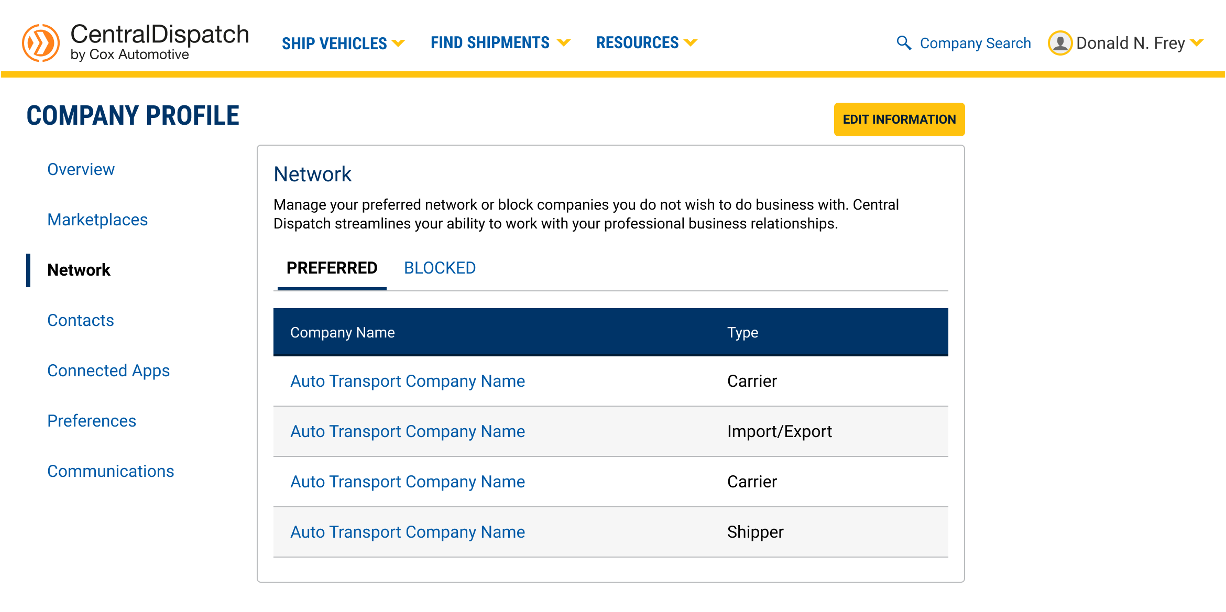
Access your Network by clicking on your account name and clicking the Company Profile link or the Network link
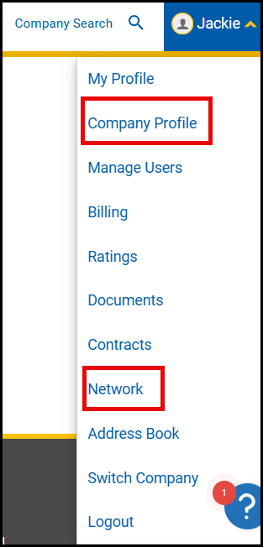
1. To Add Company to your Preferred or Blocked list, click on the appropriate tab and click Add Company
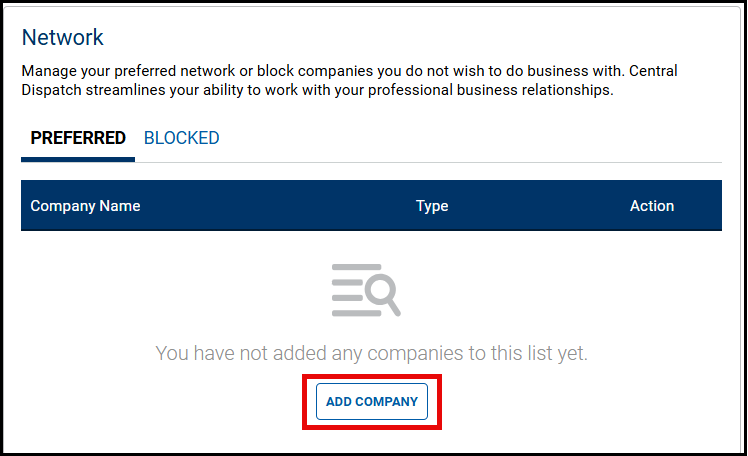
2. Search for the Company and click Add to List
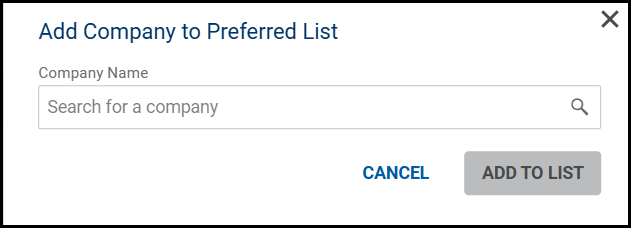
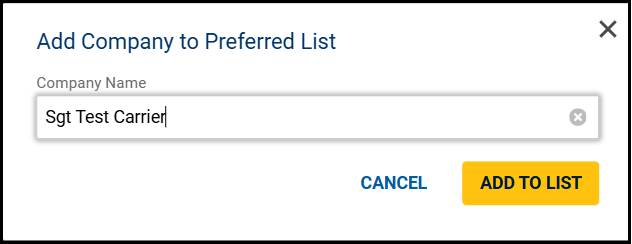
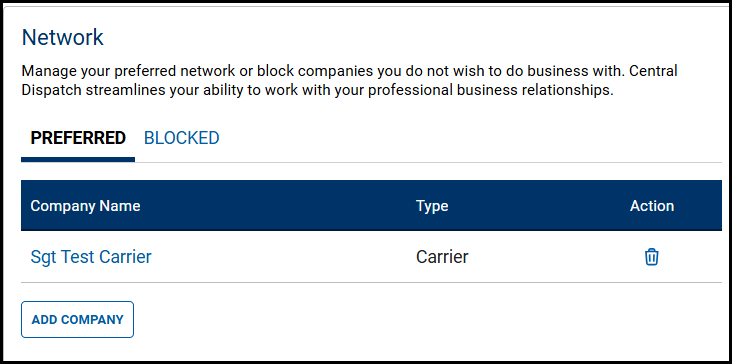
- Click the Trash Can icon under the Action column to remove the company from the Preferred or Blocked list
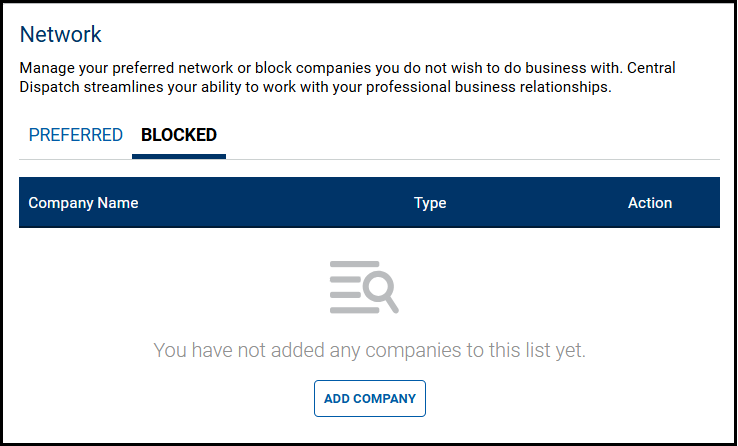
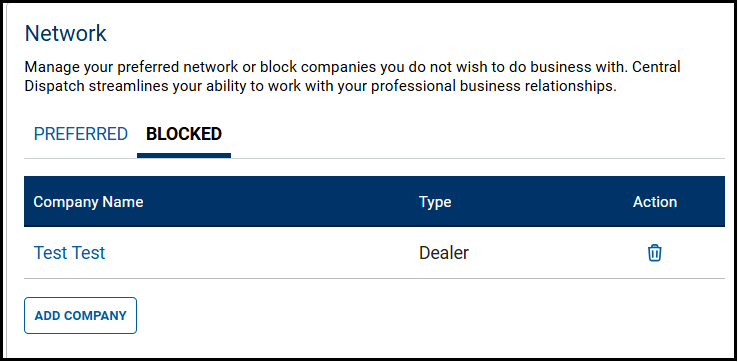
3. A company can also be added to the Preferred or Blocked list from the Company Overview page by clicking Prefer or Block button
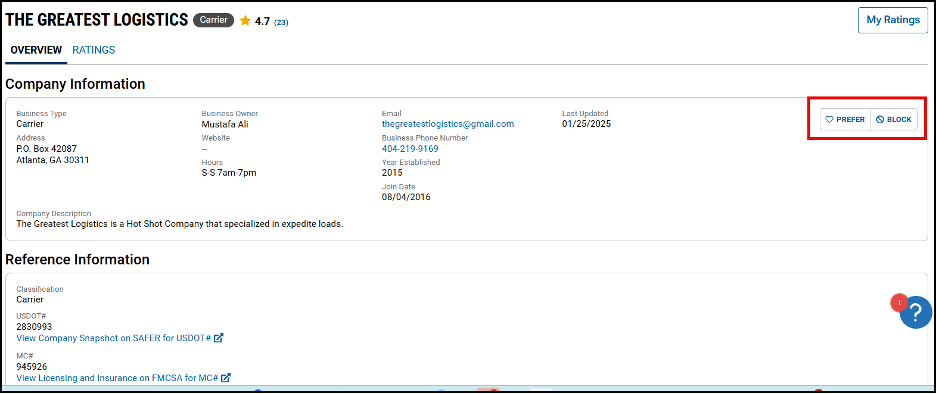
- You are also able to view if the company is on your preferred or blocked list from the Company Overview page
- Click on the Prefer or Block button to remove them from the list

Result: The company will appear on the list for their Network
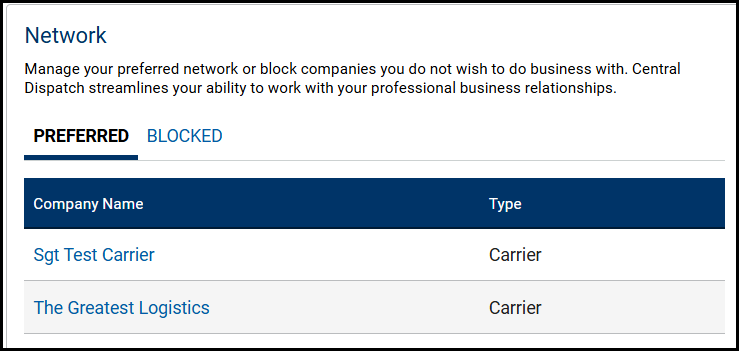
Search Vehicles
- When searching for vehicles, listings from Blocked shippers will not appear in the results
- Use the Shipper Preferences filter to include listings for Only Preferred Shippers or Include Blocked Shippers in your results
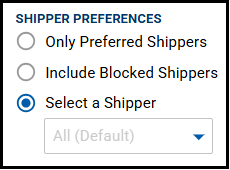
Create Dispatch or Assign Load
- When creating a dispatch or assigning a load, Preferred Carriers will display at the top of the carrier list
- Carriers that are on the Blocked list will not display when searching for carriers
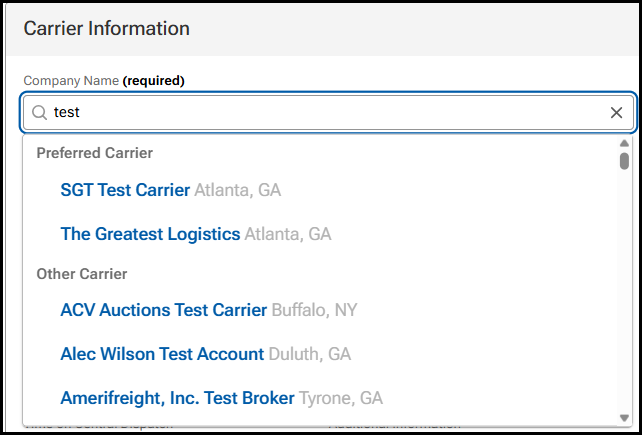
Digital logistics has brought many benefits to both shippers and carriers, but it’s also increased the risk of phishing scams. Make sure you know how to identify and avoid them with these tips and best practices from our Marketplace Integrity Team.
How To Spot Phishing
- Most phishing scams start when a bad actor contacts you via text or email, asking you to click a link. That link often looks like the Central Dispatch login page, but is in fact a phishing site designed to capture your username and password.
- Other times they’ll direct you to a fake FMCSA website where you’ll be prompted to enter your FMCSA details.
Best Practices To Keep Your Business Safe
- Pay attention to notifications from Central Dispatch alerting you to changes in your user or company profile. Take action by calling Central Dispatch immediately if this looks suspicious to you. Never click on any links received via email and/or text from third parties directing you to Central Dispatch.
- Always type the URL in your browser before entering login or account information.
- Take precautions if anyone is offering you money to re-route a delivery. Request that all changes and communications be made within the Central Dispatch platform.
- Take extra care to double-check details, like confirming the identity of the shipper or carrier. This can prevent costly mistakes and keep your business safe.
Visit our Safer Shipping Hub to learn more about other ways you can keep your business safe.
Questions about security or fraud? Contact our Marketplace Integrity team at CentralDispatchFraudClaims@coxautoinc.com
Welcome to Central Dispatch Highlights! Our all-new digest to help support you, our customers, get the most out of your Central Dispatch subscription, learn what’s happening in the industry, and gain valuable tips and knowledge. This regular email will hit your inbox and be published on CentralDispatch.com where you can always access these helpful resources.
Here are this month’s articles:
Why it’s important to secure your account with user management
Don’t let bad actors gain access to your Central Dispatch account. Set up User Management to give each employee or contractor on your team their own account and login credentials. Read our newest blog post for the tips and security best practices for improving account security with User Management.
Meet Our Marketplace Integrity Team
Meet the Central Dispatch Marketplace Integrity Team! Watch this short video to learn how this team is helping you stay safe through every step of the transportation process.
How to Stay Safe at Every Step of the Shipping Process
With fraud on the rise in our industry, helping you move vehicles safely has never been more important. Read our best practices guide, so you can use Central Dispatch with maximum confidence and security.
Shippers: Get your best practices >
Carriers: Get your best practices >
What this means for your account, and how it protects you
With increasing security challenges in the transportation industry, keeping your Central Dispatch account protected is more important than ever — and there’s a quick and easy way to do it.
Verifying your phone number allows you to use a secure multi-factor authentication method by receiving future one-time passcodes via SMS text messages instead of emails. Receiving multi-factor authentication passcodes via SMS is the most reliable and strongest method of verification.
We first began requiring multi-factor authentication for all accounts last year and are now encouraging all users to verify their phone numbers to shift to receiving one-time passcodes for MFA via SMS text messages.
It only takes a few seconds to add your phone number and enter the code sent to your phone via SMS text message. Once you verify your phone number, we will send all future MFA one-time passcodes via SMS text message, making it difficult for bad actors to access your account.
Each employee or contractor under a Central Dispatch account will need their own login credentials for fast, secure access to the platform. These credentials can be set up via User Management and will allow each user to use their own phone number as the verification method. Phone numbers will not be able to be shared across usernames inside the platform.
Make sure your current phone number is linked to your account >